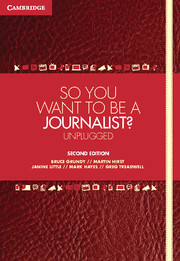Book contents
- Frontmatter
- Contents
- About the authors
- Preface to the second edition
- Acknowledgements
- Acknowledgements for the second edition
- Introduction Journalism unplugged
- Part 1 DISCOVERING JOURNALISM
- Part 2 FINDING AND UNDERSTANDING NEWS
- Part 3 NEWS-WRITING ACROSS THE GENRES
- Part 4 Legal and ethical issues
- 10 Journalism and the law
- 11 Dealing with defamation – everyone has the right to reputation
- 12 Some thoughts about ethics today
- 13 Regulating journalism
- 14 The meaning of professional in journalism
- References
- Index
13 - Regulating journalism
Open slather or not?
from Part 4 - Legal and ethical issues
Published online by Cambridge University Press: 05 October 2012
- Frontmatter
- Contents
- About the authors
- Preface to the second edition
- Acknowledgements
- Acknowledgements for the second edition
- Introduction Journalism unplugged
- Part 1 DISCOVERING JOURNALISM
- Part 2 FINDING AND UNDERSTANDING NEWS
- Part 3 NEWS-WRITING ACROSS THE GENRES
- Part 4 Legal and ethical issues
- 10 Journalism and the law
- 11 Dealing with defamation – everyone has the right to reputation
- 12 Some thoughts about ethics today
- 13 Regulating journalism
- 14 The meaning of professional in journalism
- References
- Index
Summary
Chapter objectives
After reading this chapter, you should be able to do the following:
Understand how complaints about journalistic practice can be made to various agencies
Identify several problems with the self-regulatory architecture that operates in Australia and New Zealand
Be aware of a number of aspects of some recommended approaches to improving or at least addressing the problems with journalistic self-regulation
Know about some of the objections to, and criticisms of, these recommended approaches
This chapter examines aspects of media and journalism regulation, and self-regulation, in Australia and New Zealand, and looks at how various media, and outlets within different media, seek to regulate themselves. This topic is always controversial.
Media regulation and self-regulation
In most Anglophone democracies and media environments that derive their practices and regulatory systems from British, and to some extent American, history and practices, the heavy hand of authoritarian government intervention is relatively removed from the daily operations of the media and journalism. As we know, the law touches on news every day, but only rarely does it require a show of legal force – unless, of course, a major scandal such as that surrounding the News of the World is exposed. The prosecution of journalists is rare, at least in relation to how they go about their routine business.
- Type
- Chapter
- Information
- So You Want To Be A Journalist?Unplugged, pp. 262 - 275Publisher: Cambridge University PressPrint publication year: 2012



